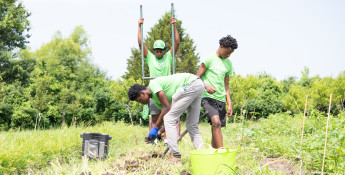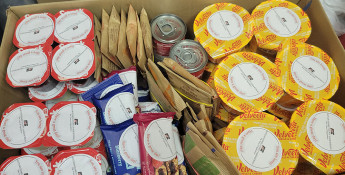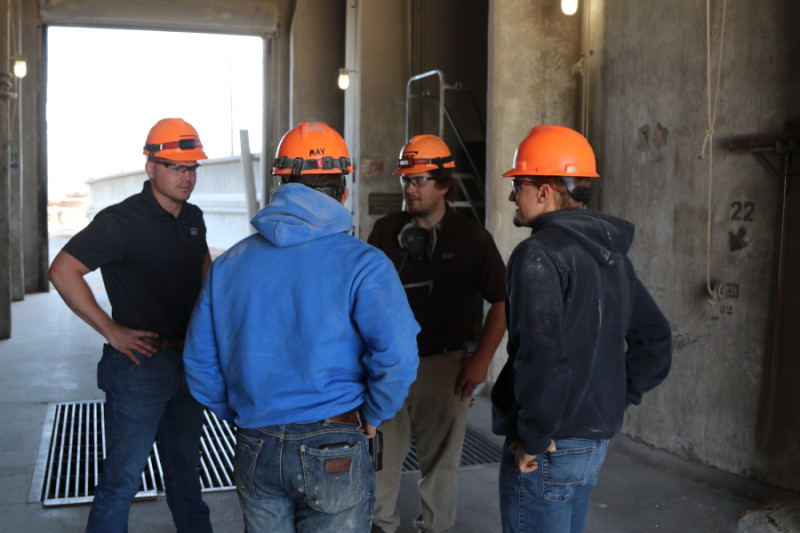By Greg Doering on February 1, 2024
Rural Kansas Apprenticeship Program Aims to Shrink Labor Shortage
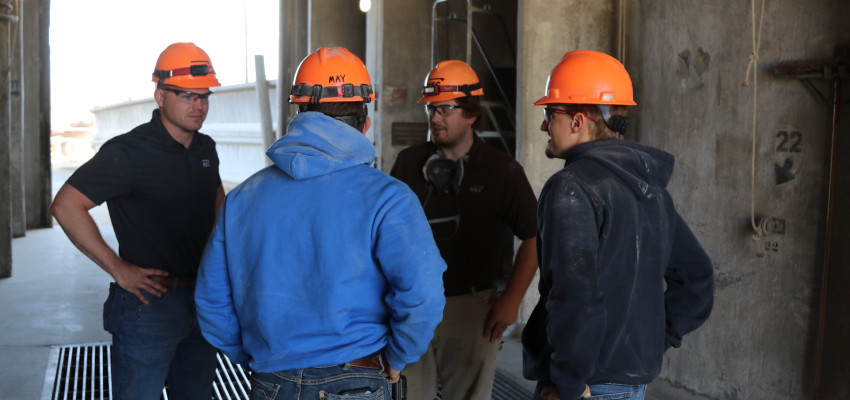
Like a lot of rural businesses, Moundridge-based Mid-Kansas Cooperative (MKC) struggles to find enough people to meet the demand of its 11,000-plus members and customers across Kansas. With more than 600 employees spread over more than 40 locations, open positions with too few applicants are common for jobs like truck drivers, grain merchandisers and agricultural equipment operators.
Hilary Worcester, MKC’s manager of learning and development, says one reason the organization struggles to fill open roles in a timely manner is they need to draw talented people from outside agriculture who don’t fully understand the positions are more than just jobs.
“We need to help people outside agriculture understand why it’s so important and show them the career opportunities,” Worcester says. “It’s so much more than you can see from the road.”
To address those needs, MKC was in the process of starting an apprenticeship program to better highlight the existing training available in entry-level jobs before learning of the Rural Kansas Apprenticeship Program (RKAP), which was started in 2022 by Kansas Farm Bureau (KFB). RKAP is the state’s first registered apprenticeship program focused solely on agriculture and rural communities to provide industry-driven career pathways for farmers, ranchers and small businesses serving agricultural areas.
TEACHER AND STUDENT
Apprenticeships originated in Europe during the Middle Ages and were focused largely on the arts and trades, like blacksmithing, carpentry or masonry. Children as young as 12 would begin an apprenticeship under the supervision and tutelage of a skilled craftsman to learn the practical skills necessary for their specific trade. After completing an apprenticeship, individuals became journeymen who traveled to other workshops to learn even more and gain experience before eventually becoming masters of their trade.
The relationship between apprentices and masters wasn’t much different than that of teachers and students. The goal was to create educated workers with the tools necessary to make a living.
“I definitely see a career path with this. It helps you learn everything you need to know when and if you do get promoted. Then you can start learning higher-up stuff.” -Jack Claerhout
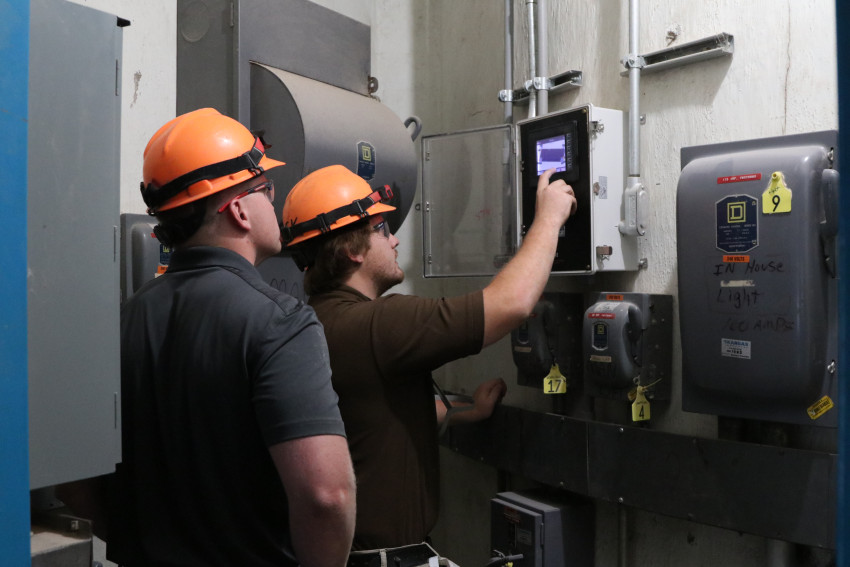 Modern apprenticeships are more formalized (and adhere to child labor laws), with so-called registered apprenticeships regulated by the U.S. Department of Labor and the Kansas Department of Commerce. The overall goal is the same as their ancient predecessors: to create pathways for individuals to acquire practical skills that lead to well-paying jobs.
Modern apprenticeships are more formalized (and adhere to child labor laws), with so-called registered apprenticeships regulated by the U.S. Department of Labor and the Kansas Department of Commerce. The overall goal is the same as their ancient predecessors: to create pathways for individuals to acquire practical skills that lead to well-paying jobs.
AGRICULTURAL APPRENTICESHIPS
KFB Chief Strategy Officer Joel Leftwich says agriculture is an industry that hasn’t fully embraced the registered apprenticeship model, but his job with RKAP is to change that.
“There’s not been a broad acceptance or understanding of registered apprenticeships in the agriculture space like there is in other trades,” Leftwich says. “One of the things we stress to people is this is a full-time job. It’s not an internship. It’s not a part-time thing where we’re trying people out. It’s an employer’s commitment to an employee and the employee’s commitment to the employer.”
On top of the job duties, there are educational and training components. Leftwich says employers are finding they can build in curricula that help set those employees up for progression in their business. The employees know up front what’s required to get a pay raise.
KFB’s board of directors started RKAP, Leftwich says, because they kept hearing members like MKC talk about how they struggled to find skilled labor. They also wanted to tackle the workforce challenge directly rather than through legislative policy changes in Topeka and Washington, D.C.
That eventually led to a conversation with the Kansas Office of Registered Apprenticeship within the Department of Commerce, which involved a learning curve on how to deal with the federal and state regulations that come with apprenticeships. Ultimately, creating a program seemed like a viable way to address labor shortages across the agricultural sector.
TAILORED SOLUTIONS
In addition to spreading the word about apprenticeships, RKAP chiefly serves as an administrative go-between for employers who hire apprentices and government regulators.
“We focus on agriculture and any business in a rural community,” Leftwich says. “If you’re a diversified farmer with a livestock operation and a row crop operation, we’re going to write a plan that’s specific to your operation. We’ll base it off a template the federal government has approved, but we’re going to tailor it so it makes sense for your operation, then help get that plan approved through the state.”
Registered apprenticeships benefit employers by developing a skilled and loyal workforce. Meanwhile, apprentices enjoy a full-time job while earning a certified credential showing mastery of their craft.
“It creates trained and skilled workers who build their careers outside a traditional classroom or college setting,” Leftwich says.
THE FIRST APPRENTICE
Jack Claerhout had already begun working for MKC as an operations specialist, a position in which he was assisting with agronomy, grain and feed operations, when he learned about RKAP. He liked the structure provided through the apprenticeship program and believed it offered more opportunities to advance, so he became MKC’s and the program’s first apprentice.“
“I definitely see a career path with this,” Claerhout says. “It helps you learn everything you need to know when and if you do get promoted. Then you can start learning higher-up stuff.”
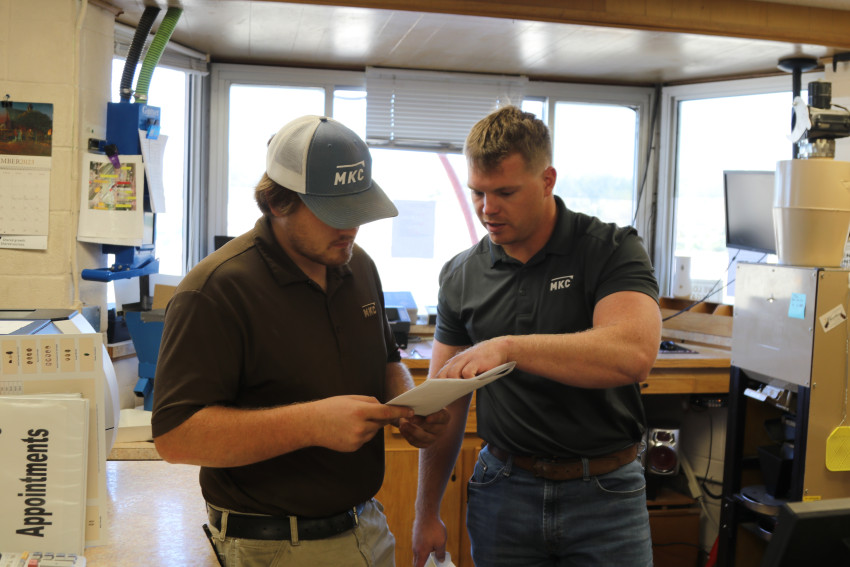 Claerhout goes through similar training as other workers, but one big difference with the apprenticeship is the amount of accountability. Claerhout uses an app designed specifically for apprentices called WorkHands to track his training at regular intervals.
Claerhout goes through similar training as other workers, but one big difference with the apprenticeship is the amount of accountability. Claerhout uses an app designed specifically for apprentices called WorkHands to track his training at regular intervals.
“My favorite part about it all is the structure and guidance it gives for training,” says Josh Crosby, MKC’s senior location manager in Walton. “We’ve got this record every week of what he did and what he needs to work on. It’s similar training, but in Jack’s case we’ve got a specific plan, and it works really well.”
Crosby also says Claerhout can gain experience by working in departments outside his own, which isn’t always the case in non-apprentice roles. Claerhout says that’s appealing because if something catches his interest, he’s able to explore it further.
“As an operations specialist, you don’t get the opportunity to work with anhydrous (ammonia, a common nitrogen fertilizer) all that much,” he says. “As an apprentice, I’d love to learn more about it and learn how to be safe with it.”
COMPANY GROWTH
MKC has always had some of the basics of an apprenticeship in place — like providing hands-on training and wage progression — but it lacked a formalized plan it could use to explain those benefits to potential employees.
The company still attracted talent like Crosby, who began his MKC career as an intern and has risen through the ranks, but Worcester wants to recruit more workers like him in entry-level positions.
“It’s been really nice to have that written down to show people,” she says. “You get a packet when you become an apprentice that says ‘this is what you’re going to learn, this is your wage progression, this is what we’re going to do."
Worcester says when looking to hire, the company lists apprentice- eligible roles and the corresponding jobs the same way, and MKC hires the best candidate. It’s been a positive change, as adding an apprenticeship option usually doubles the applicant pool for a role.
“It’s increased the depth of our pool of applicants, which shows us there is interest out there among people to get into the industry,” she says. “It’s just a matter of us expressing we’re here to train them, support them and outline that career path.”
The administrative support RKAP provides has been key to MKC’s apprenticeships, Worcester says, which makes her more effective.
“RKAP does a wonderful job of making sure we’re on the right path, and if I have questions, I reach out to them,” she says. “That way I can focus on making sure the apprentice experience is the best it can be.”
EXPANDING RKAP
Leftwich says the year since RKAP was founded has been a learning experience for the program and employers, but he’s looking forward to having more conversations with potential apprentices.
“Now that we are getting momentum on the employer side, we’re going to spend Year 2 educating and informing potential apprentices about these opportunities,” he says. “We’ll be working with schools and our fellow agricultural organizations who are talking to young people about career pathways to make sure they’re aware of opportunities around the state with RKAP.”
RKAP will continue to partner with the Office of Registered Apprenticeship to help employers meet their workforce needs. Leftwich encourages anyone with a farm, ranch, agribusiness or rural enterprise that needs employees to consider starting a registered apprenticeship.
To learn more about RKAP or to schedule a consultation, visit www.kfb.org/RKAP.


